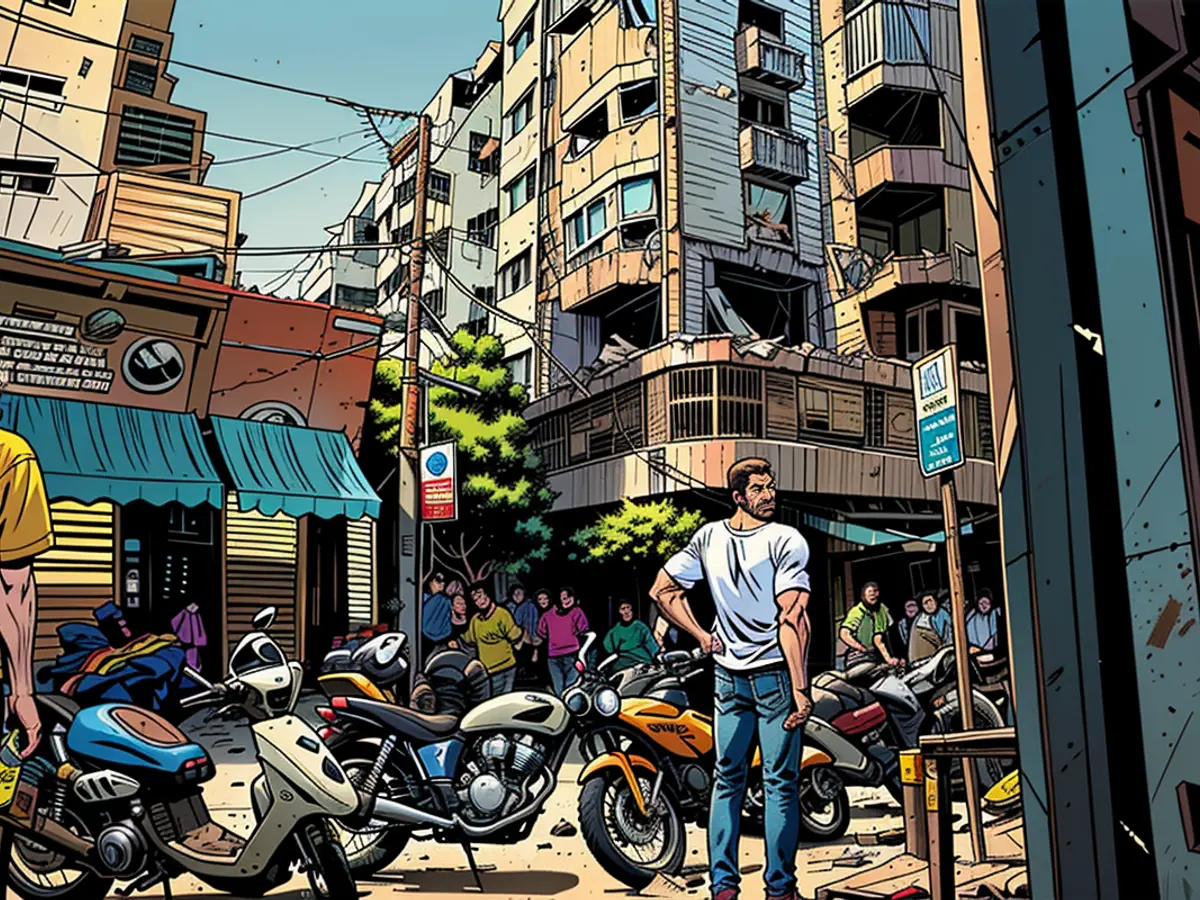"Lacking the strength to endure another displacement": Beirut grapples with the aftermath of Israeli attacks
For nearly a week, Israel has been bombing Hezbollah-controlled neighborhoods in the southern suburbs of Beirut. However, this strike in a Shia quarter near the parliament building, a part of the city that has been untouched since the 2006 war with Israel, indicated that Israel's campaign might be expanding its scope rapidly.
Suddenly, windows illuminated the skyline, causing people to wake up from their slumber with the explosion and smoke from the impacted area. Confusion enveloped the city as people attempted to locate where Israel's missiles had struck this time.
The impact site was an office associated with the Islamic Health Authority, a Hezbollah-affiliated organization, located in the central Bashura neighborhood. The death toll included nine individuals, including seven medical professionals, as reported by the health ministry and the Islamic Health Authority themselves.
Wandering in shock, the local residents roamed the impacted streets. Mothers held their infants, navigating through the chaos. Unlike other parts of the city and the country, there were no warnings for evacuation in this predominantly Shia neighborhood.
Close by was the Mohammad al-Amin mosque, a significant landmark, now symbolizing the continual displacement of approximately 1 million people as a result of Israel's air offensive in Lebanon, which started last Monday.
Those fleeing the central Beirut strike on Thursday sought refuge in the mosque's grounds. Simultaneously, those who had already been displaced were packing up to leave again.
The newly displaced were replacing the old ones, who were now seeking safer locations northern of the city.
A middle-aged woman named Fatima reflected on the chaos. She sat on a makeshift bed, leaning against a column. "The entire mosque shook. Everyone fled, fearing bombing," she recounted. "And just as they fled, others arrived."
She continued, "I couldn't leave due to my illness. I don't have the energy for displacement once more."
The Mostafa family from the southern Beirut suburbs shared a single bed among themselves among the mosque's lofty colonnades. "I cannot afford to leave this place," Mostafa Mostafa admitted. "How unfortunate, what has happened. We were once a proud Lebanese family with a roof above our heads. Our home gave us dignity. Now, look at our pathetic state."
Concerns about escalation
Since commencing on September 17, Israel's offensive in Lebanon has resulted in over 1,300 fatalities, as reported by CNN based on statements from Lebanon's health ministry. Israel aimed to return 60,000 individuals displaced by Hezbollah's rocket fire in the country's northernmost territory. However, Hezbollah was set on achieving a ceasefire on the Israel-Lebanon border only when the Israeli offensive in Gaza ended.
Israel claims that its strikes have targeted Hezbollah's weapons depots, command and control structures, and general infrastructure. Nonetheless, several civilians have been killed, according to Lebanon's health ministry, who fails to distinguish between combatants and non-combatants. A military analyst told CNN that the intensity of the campaign in Lebanon mirrors that of Gaza, where an extensive ground, air, and naval offensive demolished significant parts of the beleaguered strip.
The conflict may have reached another critical stage. Israel has gathered troops near the border and commenced its ground offensive. It has bombarded the area with artillery and drone strikes, forcing people to flee as the Israeli military aims to establish a route for an invasion of the southern part of the country and create a buffer zone.
However, Hezbollah fighters have provided a sturdy defense, using their mountainous homeland to put obstacles in the way of any invasion. According to various reports, Israeli forces have breached the armistice line between Lebanon and Israel multiple times in the last two days, conducting raids and suffering casualties before retreating.
Meanwhile, Israel's attacks on Hezbollah's civilian assets, such as the health authority on Thursday morning and its media center later in the afternoon, broadened its stated objectives to destroy Hezbollah's command and control and its arsenal.
This has given rise to concerns about mission creep, thrusting the country into uncharted waters, a place it is no stranger to.
"We are now completely paralyzed," said Mahdi, an alumnus of the American University of Beirut, located just a few minutes away from the attack site on the Islamic Health Authority.
Mahdi had relocated from the southern Beirut suburbs to west Beirut and acquired a job around his university. "Our future plans are uncertain," he noted.
"They are becoming increasingly frightening because it seems like with each passing day, things are escalating, and it's unclear what safe areas remain," said Hadeel, a medical student at the university, established by American missionaries nearly two centuries ago.
"Will it continue? Will the international community intervene, or are we simply another Middle Eastern nation?"
The escalation of Israel's campaign in Lebanon has raised concerns, with attacks extending beyond Hezbollah's military targets to civilian infrastructure. For instance, the strike on the Islamic Health Authority in the central Bashura neighborhood on Thursday brought fear to the Middle East, highlighting the potential expansion of the conflict.







